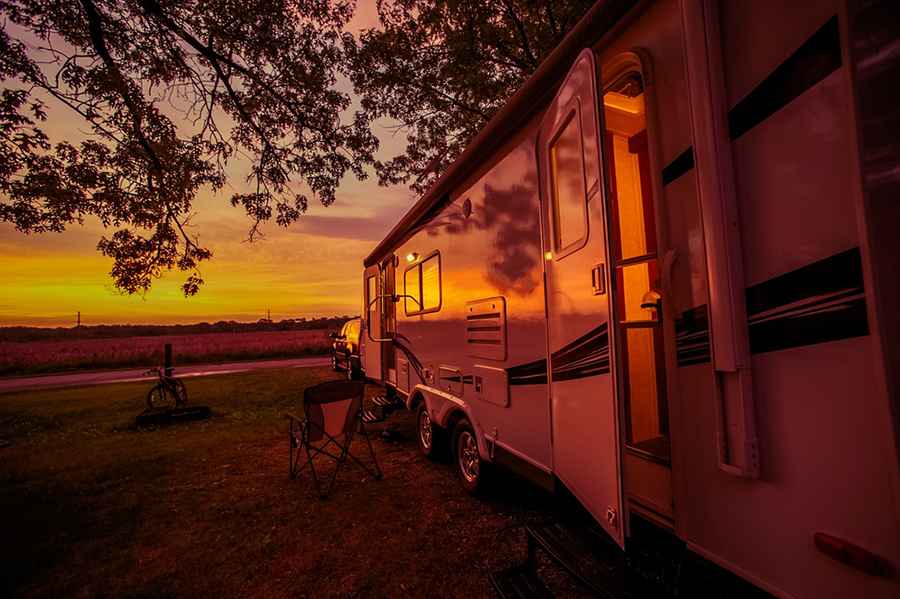Road Travel and Camping with an RV
Camping and travel go hand in hand. The great outdoors is a wonderful place to explore, and camping allows you to immerse yourself in nature in a way that few other activities can match. Not only do they offer a chance to get away from the responsibilities of daily life, but they also allow you to bond with friends and family and make memories that will last a lifetime. With the right planning and preparation, camping can be an unforgettable experience for all.

Why camp and travel with an RV?
Traveling with an RV (recreational vehicle) can offer a number of benefits. Some of the main reasons people choose to travel with an RV include:
Flexibility
An RV allows you to travel at your own pace and change your plans as you see fit. You can stay in one place for as long as you like, or move on to the next destination whenever you're ready.
Comfort
An RV provides all the comforts of home, such as a bed, kitchen, and bathroom, which makes it a great option for long-term travel.
Cost savings
By traveling in an RV, you can save money on lodging, as you can camp in RV parks or even boondocks (camp in a remote location without any facilities) for free.
Experience
Traveling with an RV can be a unique and exciting way to explore new places and create lasting memories with family and friends.
Convenience
With an RV, you have all your essentials with you at all times, which eliminates the need to constantly pack and unpack and eliminates the stress of searching for a place to sleep and eat.
Safety
In the current situation of pandemics, having an RV allows you to have your own private space, reducing the risk of exposure to the virus.
Things that you should do before camping and traveling with an RV
Being prepared for traveling and camping with an RV will help you have a safe, successful, and enjoyable camping experience. Here are some things you should definitely do in order to achieve a memorable camping experience:
Research campgrounds in advance
Look for campgrounds that offer amenities such as hookups (electric, water, and sewer), fire pits, and picnic tables. You can find RV campground information through online directories, RV travel guides, and apps.
Make reservations
Many campgrounds fill up quickly, especially during peak seasons, so it's a good idea to make a reservation in advance.
Be prepared for emergencies
Always carry a first aid kit, fire extinguisher, portable generator and other emergency supplies with you.
Check the size of the campsite
Make sure that the campsite you plan to stay at can accommodate your RV and any additional vehicles or equipment you may have.
Know your RV's capabilities
Understand your RV's limitations and make sure to only stay at campgrounds that can accommodate your needs such as power, water and sewage hookups.
Practice safe boondocking
When camping in remote areas, make sure to follow Leave No Trace principles and practice good environmental stewardship.
Be self-sufficient
Make sure to bring enough food, water, and other essentials with you, as some campgrounds may be in remote areas with limited supplies.
Be respectful to other campers and the environment
Follow campground rules and regulations, and be respectful to your fellow campers by keeping noise levels down and being mindful of your surroundings.
How to prepare your RV for travel and camping
Preparing your RV for travel and camping can help ensure that your trip is comfortable and enjoyable which is why ensuring that you have the proper RV accessories installed is important. Some popular RV accessories include:
Solar panels
These can provide a source of power for your RV, allowing you to run lights, appliances, and charge batteries.
Awnings
These can provide shade and shelter from the sun and rain, and can be a great place to relax or entertain guests.
Towing accessories
These can include items such as hitch receivers, weight distribution hitches, and sway control systems to make towing your RV safer and more stable.
Leveling blocks
These are used to level the RV when you are parked in a campsite or RV park.
Step covers
These can provide extra traction and safety when entering and exiting your RV.
RV covers
These can protect your RV from the elements and help keep it in good condition when it's not in use.
RV toilets and holding tanks
These can provide a more convenient and comfortable toilet solution for your RV.
RV mattresses
These are specially designed for RVs and can provide a more comfortable sleeping experience.
RV kitchen accessories
These can include items such as portable grills, camp stoves, and outdoor kitchens to make cooking and dining more convenient.
RV security systems
These can include cameras, alarms, and GPS tracking systems to help keep your RV safe and secure.
Image credit: Depositphotos